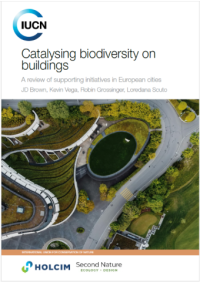The capacity of cities as landscapes to support biodiversity is accepted as one of the critical steps necessary to halt global biodiversity loss and also address the other two aspects of the triple planetary crisis, climate change and pollution. The intent of the report is to communicate opportunities for the integration of nature and biodiversity into the building scale, through the measures implemented within the individual building structure. The document provides context by reviewing global agreements and initiatives that support these themes, and discusses leading examples from global cities before providing a more in-depth review of the range of initiatives from eight European municipalities.


